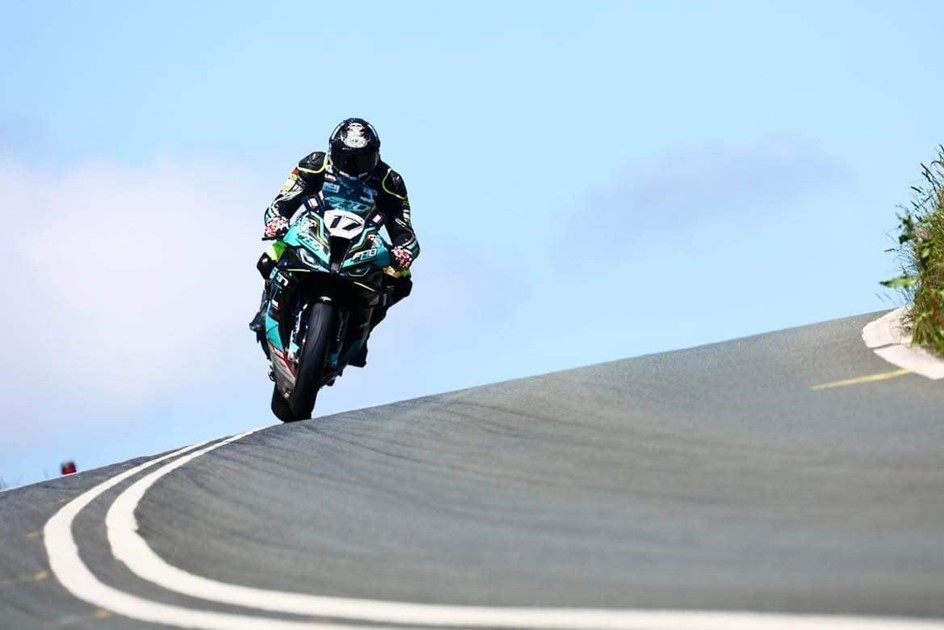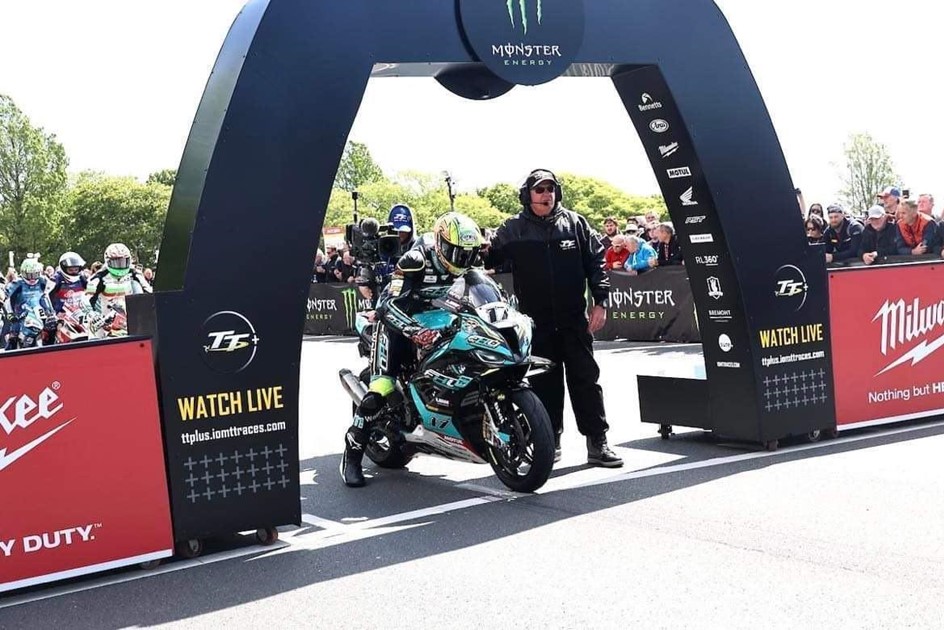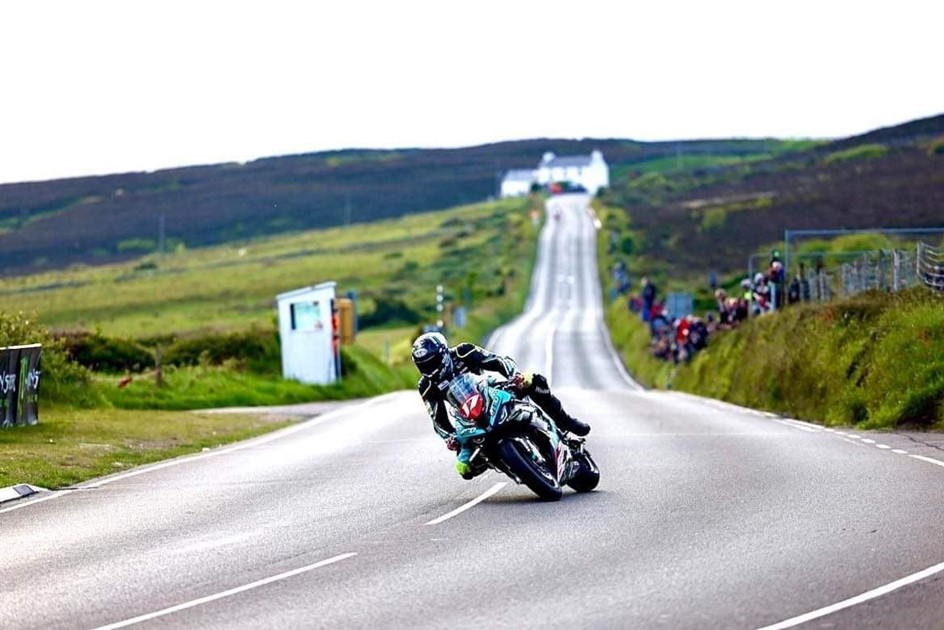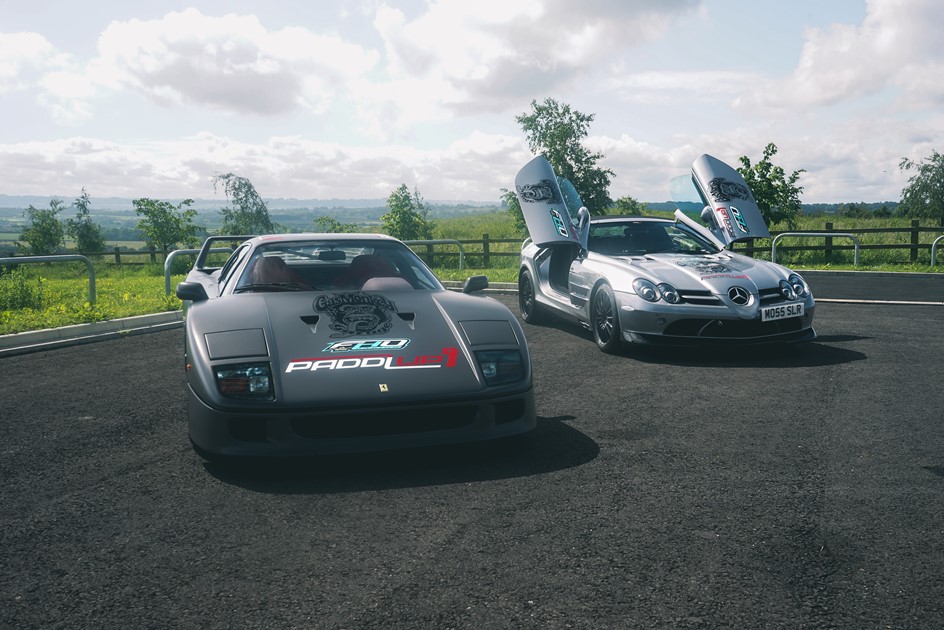Behind the scenes at the Isle of Man TT

Now that the dust has settled on the 2022 Isle of Man TT, we caught up with FHO Racing rider Brian McCormack to see how he got on and to see what it is really like to be a competitor at one of the world's toughest and most dangerous motorsport racing.
Over the course of the event, Brian endured a number of race-ending mechanical failures that hampered his efforts. Despite the unfortunate results, he recorded two top-20 finishes and set eye-catching Superstock times during the initial week of practice sessions.
In addition to the incredible speeds reached on everyday roads and the ever-lasting glory of achieving victory on the island, there's a lot that goes into the two-week event. From the mental and physical preparation that riders go through to the levels of fan interaction that are only possible at an event like the TT.
Can you tell us a bit about this year’s TT and the challenges you faced over the two weeks?
Practice week started off pretty well, we were quick on two of the bikes out of four. There were a few issues with the other two bikes but it was progressing in the right direction, we struggled a bit with the Superbike until the last night of practice when we got that one right. It was literally the last lap before the first Superbike race that it came together so we were confident heading into that first race but unfortunately, on lap two the head gasket went and the bike overheated so I had to retire from the race. That was a pity because we were showing good pace and I think we would’ve been there or thereabouts for a top ten and maybe even better.
Then we were out in Superstock and we got 14th in that race but my gearbox had a lot of issues and kept jumping into neutral so I had to nurse the bike home. We had good pace again and there was a top seven or so there for us. Another mechanical that was no one’s fault, it was just one of those things but it was very hard to ride when it was jumping into neutral at high speed.
We got a 19th in Supersport and that’s not really my class, I’m a bit big for that bike! It was also the first time I’ve ridden the Triumph so I was still getting used to that as well as the differences between riding a smaller bike at the TT with different braking markers etc. It was a learning curve but another couple of seconds would’ve put me in the top ten.
I think I got all of my bad luck out in one week by the looks of things. We were top five in Superstock for most of the first week and we were well up there at the end of practice with the Superbike which felt really good eventually.
I thrive on the longer races and a lot of them were only three laps, so when the Senior TT went up to six laps, it should've suited me better because I always get stronger as the race goes on. I got such a good start in the Senior and to be up into 10th on the first lap and to be up on my time on the second lap, I was very happy with that because I knew I’d keep getting faster as the race went on. That could’ve been a good top-six result I think but unfortunately, the luck wasn’t with me and my engine gave up. It was still good to show that I had the pace, It’s not anyone’s fault, the team supplied me with the best equipment possible so I just got unlucky.
What is it like to ride at the TT? It's historic, it's world-renowned, it's infamous. Does any of that matter once you are on the bike doing 180mph past lamposts?
It’s so different to what most people race on at short circuits and in a controlled environment, you have a lot more elements to look out for at the TT. It takes years to build up trust with the track and yourself, where each bump is and how that bump will affect your line and might put you too close to a kerb or a tree or lampost. It’s so different to anything else, even for the professional riders who do the TT every year, it takes a couple of days to get into it, your brain slows down and your eye line shifts forward. You don’t see anything in your peripheral, you just see the track but you have to be aware of certain corners and bumps and how they will affect you.
Obviously, it’s a unique track, especially the length of it. 37 miles and you’re doing six laps in the Superbike race. The preparation that goes in, both physically and mentally and then the bike preparation is different to short circuit as well, you’re more mindful because that place will break everything on the bike. You are on normal roads with bumps and potholes that are filled in. Of course, it’s in the best condition it can possibly be but it’s still just an everyday road. When traffic is on it there are diesel spills and oil spills, they are always cleaned up but you can never tell what kind of condition it’ll be in when you get there. The track changes all the time.
I love it because of how unique it is. Very few people put themselves in the position to be in the top 20 at the Isle of Man. I’m very privileged and it’s such an amazing thing to be a part of but you definitely have to know where certain lamposts are and there are certain kerbs that you don’t want to go near and certain manhole covers that you avoid.
It takes a lot of learning and years to get up to speed but it also takes time throughout the year to do your homework, whether that’s travelling to the island and doing laps in the car or playing the Playstation, it all helps.
The track generally stays the same year to year. Obviously with wear and tear some parts of the road have to be maintained and have to be looked at to be made safer, at the end of the day the organisers are trying to make it as safe as possible. Most of the lamposts and things like that have been the same throughout the years and that’s important. When you’re a newcomer or when you’re teaching a newcomer, you’re counting lamposts, there’s one that’s paler than the others and leaned over slightly and that’s where your apex is. These are all little intricacies of the Isle of Man that hopefully won’t ever change but obviously, they have to make it safer in some places as much as they can. A couple of corners have changed over the years and they have opened them up to improve safety but other than that it’s still the same parts that are very bumpy and very rough, if you drive them in a car you wouldn’t believe you’re doing 190mph on a motorbike over them.

How do you go about preparing for the TT mentally and physically?
Our season generally ends in November and then you take a few week's break over the winter but come January you start trying to get yourself into a routine to get physically fit. I personally do a lot of training because I’m a bigger guy, I try and keep the weight down as much as I can so I’m doing something four or five days a week. I do a lot of mountain biking and motocross, as much as I hate it I’ll be in the gym as much as I can but there’s nothing you can do to replicate what your body goes through at the Isle of Man. After the first couple of nights of practice, you feel like a 90-year-old man trying to get out of bed the next morning. You can be physically fit but nothing prepares you for what your body goes through, the angles you make with your body and the way your muscles work is unique as well. Some riders are luckier than others. They can not do as much and turn up and be quick but I don’t like to have a lack of fitness as an excuse.
The mental side of things is a lot of doing your homework. Going over where I was weak before and where I can improve as well as getting myself in the right frame of mind to take on what is one of the biggest challenges in motorsport. Even though I know every inch of the track I’m still watching onboards from certain riders who I know are smooth and who I know are doing it in the right way.
You’re always learning at the TT. My teammate [Peter Hickman] has won a fair few TTs now and he’s still learning. You’ll never stop learning at that place because if you change your line one or two inches to either side, you might have a smoother run and a faster line. This year was my 10th year as a TT rider and I still learned a lot this year.
The bikes are also developing really quickly. It’s been three years since we were last there and the bikes have changed, things have moved on with electronics and tyres and suspension so you’re always adapting.
Regrettably, there were some fatalities at the TT and our thoughts are with the families. How does that make you feel as a competitor when you're there? How does it affect you?
It’s a strange one for me. I’ve been in a few incidents over the years where friends have crashed in front of me and I’ve been involved in the incident. It brings it back to reality very quickly.
This is a very selfish sport when you consider how it would affect your friends and family but they know I couldn’t live without it. I’d be harder to live with if I wasn’t doing it.
I lost a good friend this year and it’s very hard to understand why you’re going out in the next race but everyone – and this comes from my team as well, my team boss, my team owner – said to me “you don’t have to go out there, no one is holding a gun to your head telling you to do anything, it’s your decision if you want to go you go and if you don’t you don’t, there are no repercussions”.
We all love what we do and there’s nothing that gives you the feeling of doing the TT. It’s very hard to replicate. I know people who bought planes or went rallying and all sorts of other things. Nothing comes close to the feeling of being a TT rider.
As hard as it sounds, you do get into the zone where once the flag drops, you’re in race mode and you forget about anything else that has happened. It might creep into your mind when you go through certain corners but you try and concentrate as much as you can.
I feel really sorry for the people who are left behind, they’re the people who have to live with what happens and that’s the harsh reality of it but we all enjoy it so much and it’s such an amazing thing to be a part of. It’s hard to be without it once you’ve done it once and the families understand that. These people die doing what they love and no one makes anyone do anything.
It’s been a tough year this year. Davy Morgan was a friend of mine who I’ve known for nearly 20 years and he sadly passed away this year. He was a legend of the TT. It’s a hard pill to swallow, I wouldn’t say we’re used to it but we’ve had to deal with it all the way through our road racing careers. We do it because we love doing it.
There is a certain atmosphere and buzz around the paddock and the island, can you describe it and how it is different to any other event you've competed at?
The big thing about the Isle of Man is that you can see all your heroes. The paddock is so accessible and the riders are so accessible to the fans. The infrastructure, the bikes, you can get so close to everyone in the paddock. You don’t get that in Moto GP, British Superbikes, World Superbikes, or Formula 1. You can’t get that close to anything and that’s why people love it.
The riders are also really respectful of each other and the fans. There’s such a great interaction between the fans, the organisers, the riders and the teams. There are no huge egos, it’s just a great atmosphere. The Isle of Man puts on this great festival where there’s music, comedians and all sorts of other entertainment like fireworks and The Red Arrows. So much effort goes into it on such a small little island but everyone is there for one reason, even the people who live there, their businesses make money from the event to keep them going for another year. Between that, the hospitality sector, the tourism board, the race organisers themselves, everyone benefits.
The spectators just have to get there, they don’t have to pay to get into the track and they can nearly touch the riders as they go past. You don’t get that in a normal setting at short circuits or anything like that.
It’s been going for 115 years so it’s part of the island's culture. You never see so many motorcycles together in one place and because they're all there for the same thing, there are never really any rows. It’s just such a nice atmosphere and buzz around the island and the event itself. Even the people in the campsites who are getting flooded in their tents just take it in their stride and take it as all part of the experience.

Does the track or certain corners change when you switch between the Supersport and the Superbike?
They all have their differences. The Superbike is faster than the Superstock but your references are nearly the same, you just know you’re carrying a little bit more speed and may brake a little bit earlier or a little bit harder but when it comes to the Supersport 600 class things are a little bit different. You have to be a bit more committed through the corners because they don’t have as much horsepower to get you out of trouble so it’s about keeping your momentum up, that’s the same with the Supertwin.
There are intricacies to each bike and you have to ride each one differently. Even down to tyres, so the Superbike will go through tyres whereas Supersport and Supertwin, you don’t have to think about that.
For braking markers, Superbike and Superstock are pretty similar because production bikes might only be 10bhp down on the Superbike nowadays. They are so close to what we’re building for Superbikes so that’s kind of crazy that there isn’t much of a difference. Then with the Supersport bikes, I haven’t ridden them a huge amount so it’s harder for me to get my reference points on them, I’m still learning in that respect. You have to carry more speed through the corners and brake less. I personally enjoy the big bikes better because that’s what I’m used to over the last 10 years, I’m not as aerodynamic as some of the smaller guys so the bigger bike's fairings give more coverage for me and that makes it a bit easier.
What is your favourite section/corner of the circuit?
This comes back to the mental side of things, I try and tell myself I like every part of the track. For me that’s the same with short circuits, if you tell yourself you don’t like a certain track then you’ve lost before you even get there.
There’s nowhere on the track that I actually don’t like. There might be one or two parts that I maybe find irritating because they’re slower like Governor's Dip, you’re nearly touching the floor and going so slowly to get through it.
What makes the TT different to any other road race?
It’s got to be the length of it, 37 miles is such a long lap. You also set off on your own 10 seconds apart so it's not a mad grid start like Ulster, the North West or the Macau Grand Prix.
It’s you and the machine against the track, you’re not dicing with people as much, you’re not racing someone wheel to wheel unless you are lucky enough to catch people, but if that’s the case you generally get past pretty easily. It’s a time trial so it’s really unique in that sense, I love that side of it, especially as I’m getting later on in my career, it means it’s more down to you and you don’t have to worry about other people’s mistakes around you. That’s something I love about the TT and I hope it never changes.
Are there any mental challenges to overcome on the course?
Especially when you have a teammate like mine, I’m constantly looking at his data and seeing what he’s doing. He’s not lying when he tells me he keeps it flat through certain corners! I ride to my comfort zone though so I build up to it, I don’t just jump in and go and do what Peter does because you have to be comfortable doing it.
Everyone’s bike handles slightly differently as well so I’m not going to do something I’m not comfortable doing. I do build up to things and I'm maybe even a bit tentative with certain parts of the track but I’m now trying to do what Peter’s doing in certain places. It does take a while to get that level of confidence, I wouldn’t say there’s a mental block but it just takes time to build up to it.
There are a few little secrets around the place that he knows better than me at the moment which hopefully we’ll try and unlock next year but we’ll work on that.
What else can you tell us about what a rider experiences during the TT?
The build-up to the event is just ridiculous. It takes a year to prepare after the last TT. Between getting all the sponsorship together – which I’m very grateful for – and getting the team together, the right people that you can trust and getting everything right for two weeks of the year is a lot. It takes it out of you a lot more than people think, even with a big team around you you’re the rider at the end of the day.
What I do throughout the day is I try to get myself into routines. I like to do the same thing every morning, have the same breakfast and stretch for an hour beforehand and listen to some music to be ready for a session. Practice week you’re out every day so it’s a lot on the body and the mind, repeating yourself every day is a big thing for me.
Every rider is different, we all have our own way of doing things. Some people are more relaxed and others are more nervous about it. I have my own routine and I like to be on my own or with my girlfriend, we just chill out and listen to music and stretch for an hour before every practice and race.
A lot of people only get on one side of the bike or put on one glove first, I don’t do any of that. I have a couple of good luck things that I keep to myself but not much else.
This year it was great to have the PaddlUp cars on the island and get to experience them at the event, bringing the two worlds together has been really cool.


